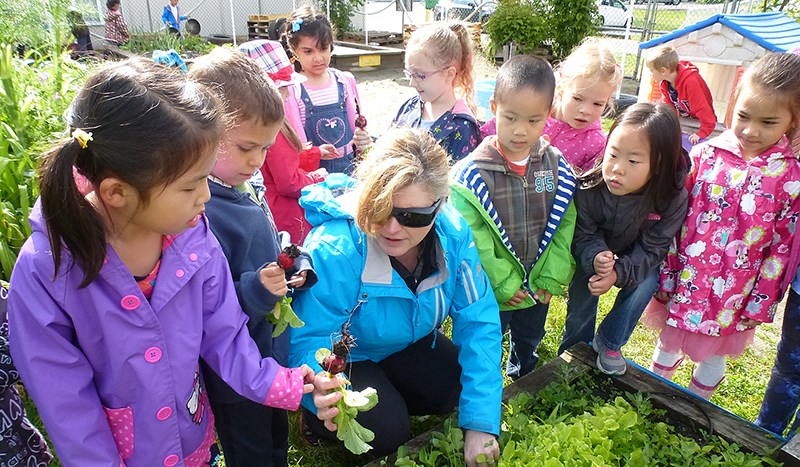Twenty years ago, a tiny seed from a child’s apple was planted in a small garden at Harbour View elementary school and nobody knew if it would grow.
Today, that seed has sprouted into a tree that faithfully produces apples every fall, and is a source of amazement and learning for dozens of kindergarten students.
The youngest students at the Coquitlam school draw the tree, watching carefully how it changes with the season and marvel at the mason bees working to pollinate the blossoms. And in the fall, the children pick the ripe apples and taste the tart fruit.
“This tree we draw, every single month,” says kindergarten teacher Leila Milonas, pointing to the leafy branches laden with fruit. “It’s a focal point for us.”
It’s hard to believe in a world where food is such an important part of life that children can grow up not knowing where it comes from and how it is produced. As cities densify and children’s outdoor spaces are reduced to squares of bark mulch topped with steel and plastic playground equipment, allowing children freedom to roam and explore nature is becoming more challenging.
Dirty hands collecting bugs on sticks — once a child’s right of passage — are now as rare as telephone land lines and home milk delivery.
But not at Harbour View, where playing in dirt, watching plants grow and experiencing seasonal changes are part of the curriculum.
“I’ve warned all the parents: ‘Kindergarten is a dirty year’ so they come to school prepared,” says Milonas.
Indeed, on the day The Tri-City News visited, the sun had just peaked out from behind the clouds, revealing a crop of rich, red strawberries. The radishes were also ready for picking and Milonas promised the kids a “radish party.”
Growing crops such as blueberries, raspberries, black currents and gooseberries is not a problem in the school’s south-facing garden. Already, a large grape vine looks like it will be a good producer and plum, peach, and cherry trees have fruit, too, while the raised beds — outfitted with an irrigation system — are stuffed with leafy vegetables and herbs, including a blossoming dill plant that gives off a spicy aroma.
“Go play, guys,” Milonas says, and soon the children are busy as bees, filling up tubs, dishes, pots and pans with water and sand, and discussing among themselves what they plan to do with the mixture.
Getting dirty — even for two girls wearing matching turquoise dresses with tulle flounces — is an important part of students’ learning.
Their teacher agrees.
“You need to be able to touch dirt and play in the sand and see things grow,” says Milonas, who blames high rates of reported anxiety among children on a lack of opportunities to explore and really get up close and personal with nature.
If the Harbour View garden looks rather carelessly thrown together, like the backyard of some grandparents’ farm, with stumps and old tires to play on, a cedar shed faded to grey, and pallets and pipes strewn about to inspire a child’s imagination, it’s because Milonas grew up on a farm in Coombs, where her grandfather raised bees. And so, in some ways, she is recreating her own childhood.
But as a teacher, Milonas says her young students learn best when they get their hands dirty and have the freedom to explore on their own. When one young boy complains another has taken his toy, she tells him to go work it out.
There is supervision, yes, a few parents even mill about, but Milonas lets the kids have some time on their own.
She is also keen about bugs. Having studied as an entomologist, Milonas shares her interest in insects with her students. They recently released lady bug larvae into the garden to eat the aphids, are raising mason bees and gleefully liberated 90 butterflies into the garden.
“These kids can identify every insect in this garden and they’re not scared of it,” Milonas says.
There has been help in the garden along the way, she acknowledges — grants, parent support, neighbours who’ve dropped off supplies or who look after the garden during summer. Her fellow teachers also grow vegetables and the school is participating in the Spuds in Tubs program of Agriculture in the Classroom Canada. Soon, students and teachers will bake 500 potatoes they grew as a snack for the whole school.
If such experiential learning is finally making its way officially into the B.C. curriculum, Milonas says it’s about time, because it’s how students learn best.
And if they get a little dirty along the way, so much the better.
[email protected]
@dstrandbergTC



